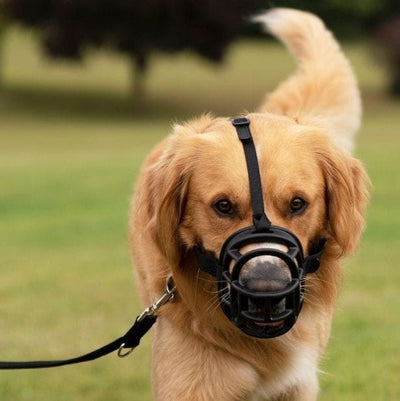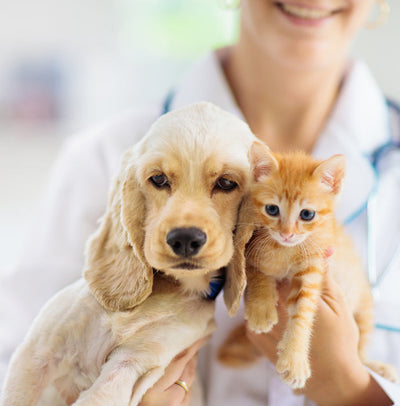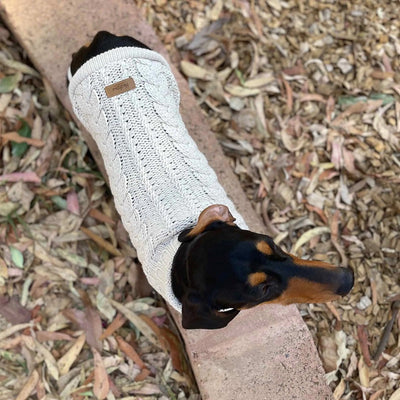
Have you ever wondered why dogs eat grass? It's a common behaviour that can leave dog owners puzzled and curious. In this article, we will unveil the mystery behind this peculiar habit and explore what it really means.
Contrary to popular belief, dogs don't graze on grass as a sign of illness or dietary deficiency. In fact, eating grass is a natural behaviour for our canine companions and can serve various purposes. Some dogs nibble on grass to satisfy their innate curiosity or to alleviate boredom. For others, it may simply be a way to add some entertainment to their daily routine.
Interestingly, eating grass can also have physiological benefits for dogs. The grass acts as a natural laxative, aiding the digestion process and helping to eliminate any indigestible materials from their system. It can help relieve stomach discomfort and even assist with the removal of hairballs.
While occasional grass consumption is generally considered harmless, excessive or compulsive grass eating may warrant further investigation. In such cases, it is important to consult with a veterinarian to rule out any underlying health issues.
So, the next time you catch your furry friend munching on grass, remember that it's just another intriguing aspect of the canine world. Stay tuned as we delve deeper into this fascinating topic and shed light on the various reasons why dogs engage in this behaviour.
Reasons why dogs eat grass
Dogs have been known to eat grass for various reasons. One reason is that they may simply enjoy the taste and texture of grass. Dogs have different preferences when it comes to food, and some may find grass to be quite appealing. It's their way of exploring different flavours and textures.
Another reason dogs eat grass is to satisfy their natural instinct to forage. In the wild, dogs would hunt for prey and scavenge for food. Eating grass can mimic this behaviour, providing them with mental stimulation and a sense of fulfillment. It's like a mini-adventure for them, as they explore their surroundings and interact with nature.
Additionally, dogs may eat grass as a way to alleviate an upset stomach. Grass acts as a natural emetic, causing dogs to vomit when they consume it. This can help them get rid of any unwanted substances or indigestible materials in their stomach. However, it's important to note that not all dogs vomit after eating grass, and vomiting should not be encouraged as a means of relieving stomach discomfort.
Is it normal for dogs to eat grass?

Yes, it is completely normal for dogs to eat grass. As mentioned earlier, it is a natural behaviour that can serve various purposes. Dogs have been doing it for centuries, and it is ingrained in their instinctual behaviour. However, it is important to distinguish between occasional grass consumption and excessive or compulsive grass eating.
There are many benefits for dogs that come with eating grass, in fact, there is a pet grass specifically grown for dogs, cats, reptile, birds, reptiles and small animals. This grass is a rich source of vitamins A, B, C, E and K. It is known to assist good gut health! Learn more here about How Fresh Pet Grass Can Improve Your Pet's Overall Well-Being
If your dog only eats grass occasionally and shows no signs of distress or illness, there is usually no cause for concern. It is a harmless behaviour that can be attributed to their innate curiosity or foraging instincts. However, if your dog is constantly eating grass and showing other signs of discomfort or illness, it is recommended to consult with a veterinarian to rule out any underlying health issues.
Theories behind why dogs eat grass
There are several theories that attempt to explain why dogs eat grass. One theory suggests that dogs may eat grass to fulfill a nutritional deficiency in their diet. However, research has shown that dogs who are on a well-balanced diet and receive proper nutrition are still inclined to eat grass. This suggests that nutritional deficiency is not the primary driving factor behind this behaviour.
Another theory proposes that dogs eat grass to induce vomiting when they have an upset stomach. As mentioned earlier, grass acts as a natural emetic and can help dogs relieve stomach discomfort. However, not all dogs vomit after eating grass, so this theory may not apply to every dog.
Some experts believe that dogs eat grass simply because they enjoy the taste and texture. Grass can provide a refreshing change from their regular diet and add some excitement to their mealtime. It's like a culinary adventure for them, as they explore different flavors and textures in their environment.
The potential health risks of dogs eating grass
While occasional grass consumption is generally considered harmless, there are some potential health risks associated with dogs eating grass. One concern is that the grass may contain pesticides, herbicides, or other chemicals that can be harmful to dogs. It's important to ensure that the grass your dog has access to is free from any potentially toxic substances.
Another risk is that the grass may be contaminated with parasites, bacteria, or other pathogens that can cause gastrointestinal issues in dogs. Dogs who eat grass in public parks or areas frequented by other animals are at a higher risk of ingesting these harmful microorganisms. It's important to monitor your dog's grass-eating habits and ensure they are not exposed to contaminated grass.
Additionally, some dogs may have allergies or sensitivities to certain types of grass. Eating grass can trigger an allergic reaction or cause gastrointestinal upset in these dogs. If you notice any signs of discomfort or illness after your dog eats grass, it is recommended to consult with a veterinarian to rule out any underlying allergies or sensitivities.
How to prevent dogs from eating grass
If you are concerned about your dog's grass-eating habits, there are several steps you can take to prevent or minimize this behaviour. One approach is to provide your dog with alternative sources of mental and physical stimulation. Engage in interactive play sessions, provide puzzle toys, or take your dog for regular walks to keep them mentally and physically active. This can help alleviate boredom and reduce the need for grass consumption.
Another strategy is to ensure that your dog's diet is well-balanced and meets all their nutritional needs. Dogs who are on a nutrient-rich diet are less likely to engage in grass eating as a means of fulfilling a nutritional deficiency. Consult with your veterinarian to determine the best diet for your dog's specific needs.
If your dog's grass eating is primarily driven by an upset stomach, consider providing them with natural alternatives to grass that can help alleviate digestive discomfort. For example, you can offer them small amounts of cooked pumpkin or plain yogurt, which can have similar soothing effects on the stomach.
When to be concerned about dogs eating grass
While occasional grass consumption is generally considered normal, there are certain signs that indicate you should be concerned about your dog's grass-eating behaviour. If your dog is eating grass excessively or compulsively, to the point where it interferes with their daily activities or causes distress, it is recommended to consult with a veterinarian.
Excessive grass eating can be a sign of an underlying medical condition, such as gastrointestinal issues, dietary allergies, or behavioural disorders. A thorough examination by a veterinarian can help identify any potential health concerns and determine the appropriate course of action.
What does it mean when a dog eats grass excessively?
Excessive grass eating in dogs can have various meanings and implications. It can be a sign of gastrointestinal distress, such as an upset stomach or inflammation in the digestive tract. Dogs may eat grass excessively to alleviate discomfort or to induce vomiting in an attempt to get rid of any irritants in their system.
Excessive grass eating can also be a manifestation of anxiety or boredom. Dogs who are stressed or anxious may engage in repetitive behaviours, such as compulsive grass eating, as a way to cope with their emotions. Similarly, dogs who are bored or under-stimulated may resort to grass eating as a means of entertainment or to fulfill their need for mental stimulation.
If your dog is eating grass excessively, it is important to observe their behavior and look for any other signs of distress or illness. If you are concerned, it is recommended to consult with a veterinarian to rule out any underlying health issues or behavioral problems.
Other possible explanations for dogs eating grass
While the exact reasons why dogs eat grass may still remain somewhat of a mystery, there are other possible explanations for this behavior. Some experts suggest that dogs may eat grass as a way to cleanse their palate or freshen their breath. Grass can provide a refreshing sensation and help remove any lingering tastes or odours from their mouth.
Another theory proposes that dogs eat grass as a means of self-medication. Dogs have been known to seek out specific plants or herbs when they are feeling unwell. Grass may contain certain nutrients or compounds that can help alleviate minor ailments or discomfort in dogs.
It's important to note that these theories are speculative and have not been definitively proven. The exact reasons why dogs eat grass may vary from dog to dog, and each dog's behaviour should be evaluated on an individual basis.
Understanding your dog's behaviour
The mystery behind why dogs eat grass is gradually being unveiled. It is a natural behaviour that can serve various purposes, from satisfying curiosity to providing entertainment and aiding digestion. While occasional grass consumption is generally harmless, excessive or compulsive grass eating may warrant further investigation.
By understanding the reasons behind your dog's grass-eating behavior, you can better assess whether it is a normal part of their behaviour or if it requires attention from a veterinarian. Remember to provide your furry friend with a well-balanced diet, alternative sources of mental and physical stimulation, and a safe environment free from toxic or contaminated grass.
Ultimately, dogs have their own unique preferences and behaviours, and grass eating is just another intriguing aspect of the canine world. Embrace their quirks and enjoy the journey of unraveling the mysteries of your furry friend's behaviour.
© weknowpets 2023





